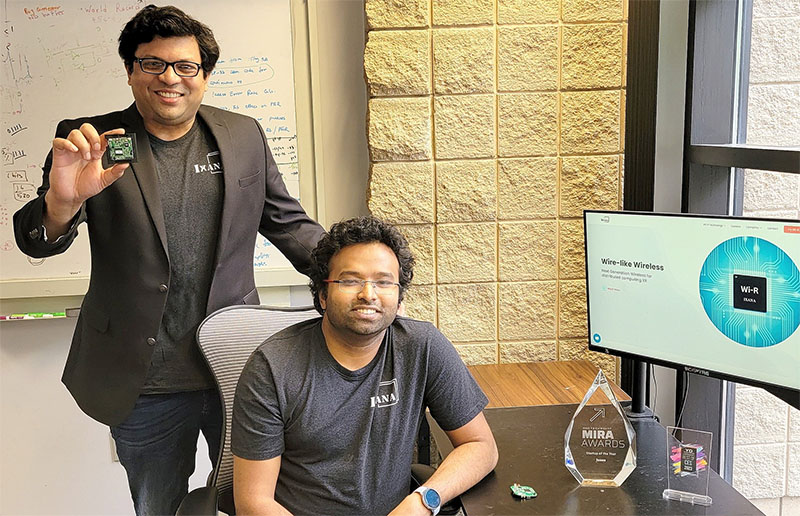Purdue Ventures invests in wearable communication chip company Ixana
Ixana’s patented high-speed Wi-R silicon chip communicates with 100 times more energy efficiency and is more secure than traditional wireless technologies

Shreyas Sen (left), the Elmore Associate Professor of Electrical and Computer Engineering at Purdue University, and Shovan Maity, a Purdue alumnus, are two co-founders of Ixana. The company’s high-speed Wi-R silicon chip allows high-speed broadband communication among on-body devices to securely communicate at a fraction of the energy cost. Purdue Ventures has invested $250,000 in Ixana, part of a larger $3 million seed-funding round for the company. (Photo provided by Ixana)
WEST LAFAYETTE, Ind. —
Purdue Ventures, which manages multiple early stage investment funds to support Purdue University-connected startups, has invested in Ixana, a company that provides wearable smart devices with the ability to securely communicate with touch.
Purdue Ventures’ investment is part of a larger $3 million seed funding round for Ixana, including backing from EvoNexus, Hack VC, Paradigm Shift Capital, Samsung Next and Uncorrelated Ventures.
Ixana’s high-speed Wi-R silicon chip debuted during the January 2023 Consumer Electronics Show in Las Vegas. The technology is based on patented, published, peer-reviewed research conducted by Shreyas Sen, the Elmore Associate Professor of Electrical and Computer Engineering in Purdue University’s Elmore Family School of Electrical and Computer Engineering and director of Purdue’s Center for Internet of Bodies.
Sen said the Wi-R wirelike wireless developed by Ixana has the potential to transform how wearable devices communicate with each other.
“The technology utilizes the conductive properties of the human body to guide tiny amounts of Electro-Quasistatic, or EQS, fields around the person,” Sen said. “This allows high-speed broadband communication among on-body devices to securely communicate at a fraction of the energy cost compared to conventional wireless communication technologies. This allows wearables to use computing in smartphones without affecting battery power or latency.”
Sen said the human body hurts traditional wireless communications by absorbing radiofrequency signals.
“Radio was not designed to communicate around humans because of the high water content in our bodies,” Sen said. “On the other hand, the human body helps EQS fields, making communication efficient.”
The ultimate end users of Ixana’s technology are everyday consumers of personal electronic devices such as smartphones, smartwatches and other upcoming on-body devices.
“Today, every wearable device has its own CPU and communicates only when required because wireless is inefficient,” Sen said. “Wi-R provides a virtually free ‘wire’ that enables efficient distributed computing on the body; all wearables can piggyback off the computing in the smartphone or another body-worn hub without a significant battery or latency hit. This means every wearable device can have access to real-time AI.
“Wi-R reimagines the architecture of wearable computing from standalone devices on the body to a tightly coupled computer-communication network connected by the body itself to enable longer-lasting, more secure devices while making the network more intelligent. In the process, it helps increase the adoption of wearables in the coming decades.”
Ixana co-founder and CEO Angik Sarkar said artificial intelligence has advanced by leaps and bounds in the last few years, but it forms only a small part of people’s everyday lives.
“The challenge is we largely interact with AI when we look at a screen or through voice prompts,” Sarkar said. “Ixana’s long-term goal is to enable our brain to interact with AI in real-time, all day long, while being in our physical world.”
Sarkar said the Purdue Ventures’ investment will impact Ixana in several ways.
“Ixana’s North Star is to make Wi-R ubiquitous in devices such as smartphones, smartwatches and AR/VR headsets,” Sarkar said. “Purdue Ventures’ investment moves Ixana closer to that goal. Further, the backing of Purdue Ventures helped leverage more investors to invest in Ixana. Being associated with Purdue University and Purdue Ventures means more partners and investors believe in the technology.”
Ixana has several ties to Purdue, including licensing Sen’s patented research through the Purdue Research Foundation Office of Technology Commercialization. Sarkar and Shovan Maity, Ixana’s co-founder and head of research, both earned their doctoral degrees in electrical and computer engineering at Purdue.
Riley Gibb, associate director of Purdue Ventures, said Ixana’s strong connections to Purdue research is a key qualifier for investment.
“We also recognize Ixana has taken a technological lead by creating the world’s first high-speed Wi-R silicon chip,” Gibb said. “This innovation and its multiple applications will have an impact upon the adoption of wearable technology.”
In April Ixana won the Startup of the Year category in the Mira Awards, which recognize the achievements of companies, individuals and organizations in Indiana’s tech industry. A three-minute video of David Yang, product engineer at Ixana, accepting the award is online.
About Purdue Ventures
With almost $20 million under current management, Purdue Ventures manages multiple pools of capital in collaboration with the university ecosystem and local corporations, enabling Purdue startups to improve the world.
About Ixana
Ixana is developing high-speed human-computer interfaces with all-day, real-time, distributed AI. Licensing Purdue University intellectual property through the Purdue Research Foundation Office of Technology Commercialization, Ixana has developed Wi-R, a non-radiative communication technology for wearables.
Writer/Media contact: Steve Martin, sgmartin@prf.org
Sources: Riley Gibb, rtgibb@prf.org
Shreyas Sen, shreyas@ixana.ai
Angik Sarkar, angik@ixana.ai



